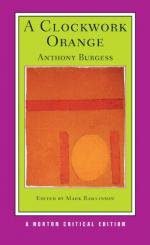|
This section contains 2,999 words (approx. 8 pages at 400 words per page) |

|
In the following essay, Rabinovitz examines ethical values in Burgess's Clockwork Orange.
In Anthony Burgess's most famous novel, A Clockwork Orange, the most obvious clash of values is between the lawless hero and a society that hopes to control him. This struggle obscures another conflict which is nevertheless very important: the opposing views of libertarians and authoritarians on how best to provide social controls. The theme of libertarian-authoritarian opposition recurs throughout Burgess's novels, often as a conflict between points of view Burgess has called Pelagian and Augustinian. The best exposition of this idea is given by Tristram Foxe, the protagonist of Burgess's novel The Wanting Seed.
Foxe (who is a history teacher) explains that Pelagianism is named for Pelagius, a monk whose teachings were condemned by the church. Pelagius argued against the doctrine of original sin and advocated the idea of human perfectibility; hence he is the...
|
This section contains 2,999 words (approx. 8 pages at 400 words per page) |

|




